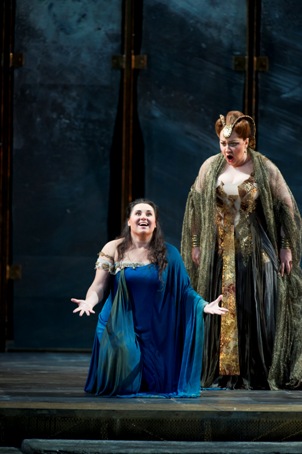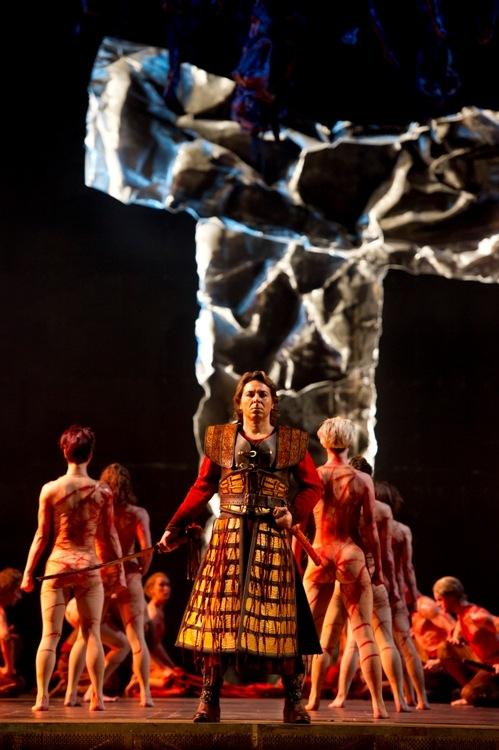What kind of Aida would you prefer: one in which singing actors stretched to the limits find Verdi's human volcano of emotions beneath the cod-Egyptian rubble, or a stand-and-deliver production with a stalwart cast of beaten-bronze voices? Having had a taste at least of the former once in my life, I wasn't very happy to succumb to the latter in this Covent Garden revival. It was the wall of sound in the big Act II ensemble which made me at least willing to be convinced.
And then I wasn't. And then I was again. It's that kind of a show, a reminder of the bad old repertoire days at the Royal Opera after the total work of art, love it or hate it, of Anna Nicole. On an ugly, selectively lit set which proves unreadable right from the revolving wall at the start, singers who can't, or won't, act make actors and dancers who can seem daftly hyperactive in what amounts to ancient carry-on as usual with extra bodies and blood (did the Egyptians indulge in human sacrifice? A whole article devoted to the subject in the programme doesn't say. But where are we, anyway, and who cares?). It does seem bizarre that David McVicar, a director whose sensitivity and visual flair have created fully realised worlds in operas as different as Giulio Cesare, Der Rosenkavalier and Adriana Lecouvreur, to name but three, should be so stumped by the mainstream rep's last hoary melodrama to contain superb music that he doesn't appear to have come up with a coherent mise en scène.
But then you never know if the kind of singers making up the so-called "A cast" of this revival would be amenable to direction anyway. It gets off to an unpromising start with that wall in the Prelude - plunging the auditorium into darkness didn't incline the first-night audience to listen to the pianissimo violin phrases depicting our Ethiopian heroine - and Roberto Alagna having to tackle the notoriously difficult "Celeste Aida" minutes later. This Radames isn't the kind of warrior who'd let a grande amoreget in the way of military ambition; the vocal armour doesn't come off for a minute. Alagna started his career loud, developed a few scruples over the years, and now is loud, if lustrous and occasionally excitingly sharp, again. As for the acting, it's raise the left arm, raise the right arm, raise them both and bring them together (which by Act III becomes place left leg on ramp and down, right leg up and down, step up with both).
Then there are the redoubtable mezzo/contralto Olga Borodina (pictured below on the right), finding plenty of vocal colour as the Egyptian princess who loves him in vain but nothing more in the way of interaction - always the real Verdian thing, though - and Ukrainian newcomer Liudmila Monastyrska (pictured below left) as her slave and abhorred love rival, who probably might act a bit if she'd had the time, but was having to replace a pregnant Micaela Carosi at the very last moment (doesn't an expectant mother know in good time when the singing has to stop?). I'd like to see once again a consummate singer-actress like the African-American Adina Aaron, my brief brush with the dramatic possibilities of the role in an otherwise conventional Savonlinna production, who conjured the ideal vision of a proud princess having to assume the humility of a slave; maybe "B cast" audiences will get that with Latonia Moore. But this was some house debut as far as the voice went. Monastyrska's lyric-dramatic soprano, both big and warm, is laser-beam powerful in ensembles and duets, but also capable of the softest nuances which multiply as this schizoid role progresses.
 That she did not perhaps have the most supportive and alert conductor in Fabio Luisi seemed to be confirmed by his problems with Alagna, though the tenor may be notoriously hard to catch. Orchestral colour could be bewitching in the Nile music and the dances, however flaky the choreography, less good in cushioning and floating the singers in their longer lines until we reached a surprisingly tender and elevated final scene where the lovers expire ever so seraphically in the underground vault. You imagine it might take a long time for Monastyrska to run out of breath; the technique seemed fairly unassailable, and though she's scheduled to sing Verdi's Lady Macbeth next, maybe it's already time for the major houses to think about the path to Brünnhilde and Elektra.
That she did not perhaps have the most supportive and alert conductor in Fabio Luisi seemed to be confirmed by his problems with Alagna, though the tenor may be notoriously hard to catch. Orchestral colour could be bewitching in the Nile music and the dances, however flaky the choreography, less good in cushioning and floating the singers in their longer lines until we reached a surprisingly tender and elevated final scene where the lovers expire ever so seraphically in the underground vault. You imagine it might take a long time for Monastyrska to run out of breath; the technique seemed fairly unassailable, and though she's scheduled to sing Verdi's Lady Macbeth next, maybe it's already time for the major houses to think about the path to Brünnhilde and Elektra.
With two other fine voices, Vitalij Kowaljow's High Priest and Brindley Sherratt's King, almost smothered by silly costumes and war paint, and the choruses musically nuanced but insufficiently differentiated - we need to know exactly who the priests are - it was left to Michael Volle's powerful, perhaps un-Italianate but infallibly secure Amonasro to inject some semblance of believable drama. I guess he must have made Monastyrska momentarily feel like she meant something to someone else on stage, so close did he clutch her in the crucial father-daughter duet of Act III, and his first appearance in the middle of all that ludicrous blood-sacrifice pomp raised the drama, which had only sparked just a little in the Aida-Amneris confrontation, to a level from which it didn't descend until after the interval.
Otherwise, you'd have thought that second time around might have been the ideal opportunity for McVicar and his team to have a rethink on intent and design. As it is, this Aida as a concept is hardly more engaging than the shallow Elijah Moshinsky farrago previously seen at the Garden, and not nearly as beautiful to look at as the much-maligned Robert Wilson production which came in between. For all its fatal stillness when the music blazed, that might have been more successfully wheeled out for the present team of world-class singers. As it is, Covent Garden will have to try again. Or just do Aida in concert, which I'd be quite happy to hear with these ladies, at least.















Add comment